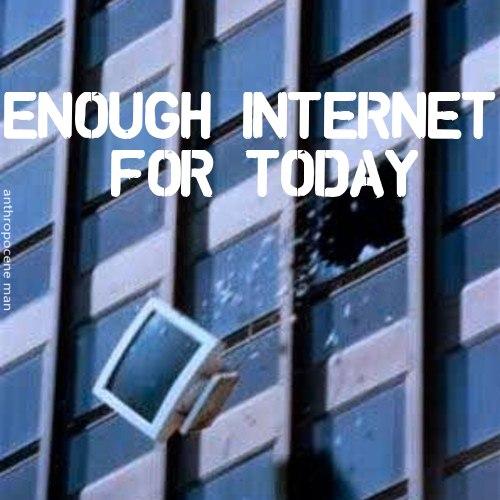
Internet hangover, spirit of time
Originally published in Portuguese in September 2018
I write and follow the discussions, advances and setbacks of the internet and of what is conventionally called digital culture since 2008, when BaixaCultura was born. It has been 10 years and so much has changed in this period that I can point out not only specific issues, but a whole spirit of the time (as the Germans say, zeitgeist) that is different today. Which can be summarized in an expression that I have been using for some months now: “Internet hangover” (Ressaca da internet). We have deposited so many possibilities of freedom (independent information from major media groups, freedom to speak what we want, to create new technologies and worlds) that we have neglected, or failed, to pay attention to the rise of monopolies of technology companies, the construction of information bubbles that confirm points of view, and the increasingly real possibility of the Internet becoming cable TV, with the already proclaimed end of net neutrality. We have taken a extra-dose of optimism. And now – or rather, since at least 2016 – we are in the hangover phase, hostage to internet monopolies, the commercialization of any data left on the net, fake news arriving from all sides. Pure dystopia.
The curtailment of the internet by private companies like Google, Facebook, Amazon, and Apple is one of the main elements in building this spirit. What is left of the internet today if not the platforms, software and devices of these companies? For the majority of the Brazilian and world population, not much. About 70% of Brazilians access the web through their cell phones, and not infrequently, they only access services such as Facebook, WhatsApp, and Instagram when connected, all from the same company. There are other options from search engines to Google, for example (DuckDuck is the main one), and from smartphone operating systems to Android and Apple’s IoS, but look aside and see how many people actually use these alternatives? The internet is already today what many of us free internet activists feared it would be: a big walled garden, where increasingly the ones calling the shots on what and how to access it are large private companies based in the US.
I remember, at the end of 2011, when I wrote a report on the fight for the defense of internet principles, such as net neutrality, based on Yochai Benkler’s speech at the opening of the Festival Cultura Digital.br this year. Even at that time, the questioning about the end of net neutrality and the growth of large monopolies was a current issue, although not with as much presence as today. At the time, I started the text with the question: “is it utopian to think of a democratic and free internet, without privileges of access and data traffic for any side, just as it was defined in the principles of the development of the internet?” From there, I told a story that I witnessed in class, in one of the many times I spoke about culture and free licenses for communication students, when a student asked if keeping the Internet free was not a utopia, or naivety. I answered, at the time, no: “The internet was created this way, as a decentralized and autonomous network. And we are not talking about a utopia, but a reality; the Internet today works this way”. Years later, was the student right?
In 2011, the fight for a free internet was less thankless than it is today, and I myself believed that we would be able, as a civil society, to keep the internet as it was created, or at least guaranteeing some of its basic principles such as neutrality. After almost seven years, I do a mea culpa. I didn’t know – or didn’t want to believe, or didn’t want to write or speak publicly that I didn’t believe – that the big internet players would turn the internet into what it is today, a closed space where we are trapped in private algorithmic bubbles of which we know little or nothing about how it works. And only since a year ago, with Trump and Brexit, have we started to see the potentially harmful for politics of this arrangement between people and technical systems like Facebook and Google. Like many, I doubted and did not want to see that capitalism reinvents itself and appropriates everything it sees in front of it, including a network that was born a libertarian part like the Internet.
TED, that famous format of quick lectures recorded on video that has spread around the world, had one last major edition in April 2018 in Canada. Two speeches manifested this internet hangover zeitgeist. Jaron Lanier, one of the creators of the idea of virtual reality, musician and computer scientist. “We made a particular mistake in the beginning. The nascent digital culture believed that everything on the Internet should be public, free. At the same time, we loved our tech entrepreneurs. We loved this Nietzchian myth of the tech man who transforms the universe. How to celebrate entrepreneurship if everything is free? A model based on advertising. Google was born free, Facebook was born free. The ads in the beginning were for your local dentist or something. But the algorithms get better. And what started as advertising can no longer be called advertising. Today it is behavior modification. I don’t call these things social networks anymore. They are behavior modification empires. This is a global tragedy born of a gigantic mistake. And let me add another layer. In behaviorism, you offer a creature, a rat or a person, small gifts or punishments depending on what they do. In networks, social punishment and social rewards fill this role. You get all happy – ‘someone liked my stuff’. Consumers of these behavior modification empires get feedback on everything they do, they realize what works, they do more of it. And they respond more to negative emotions, because these trigger faster reactions. So even the most well-meaning people feed negativity: the paranoiacs, the cynics, the nihilists. These are the voices amplified by the system. And you can’t pay these companies to make the world better or to fix democracy because it is easier to destroy than to build. This is the dilemma in which we find ourselves.
The greatest danger facing democracy is that the revolution in information technology will make dictatorships more efficient than democracies. This was the statement that Folha de S. Paulo decided to highlight in the TED talk given by Israeli historian Yuval Noah Harari. To prevent the rise of fascism and avoid new dictatorships, the historian proposed that engineers find ways to prevent information from being concentrated in the hands of a few and make sure that distributed information processing is as efficient as centralized. “That will be the main safeguard of democracy,” he says.
You may not be new to Harari’s call to action. The question is the how-to or if it is possible to do it. In what practical ways can computer engineers make information processing more decentralized? Do they want to do this? Is it still possible to tackle the big information hubs of the social networks from small decentralized initiatives? Or should we focus our efforts – we and all those who are not engineers – on not allowing ourselves to be manipulated by those who control information? I bring here more questions than answers because, of course, everything is happening now; while we are trying to come out of the hangover, we keep asking questions and groping for principles of certainty in order to act soon. Or to act with more clarity, since many are already acting around the world.
[Leonardo Foletto]




Deixe um comentário